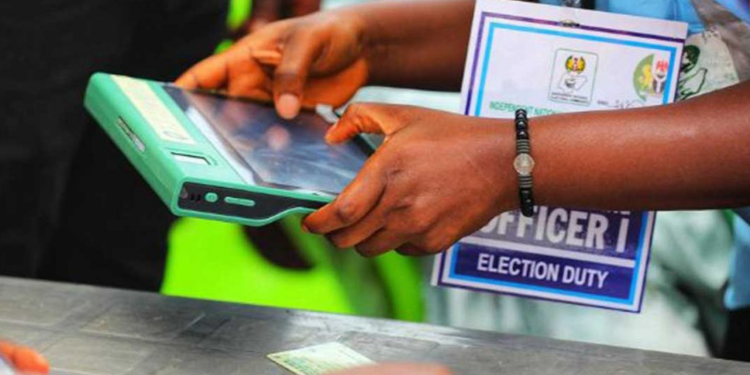The recent Tribunal judgement on the Osun Governorship Election seems to have put the much revered Bimodal Voter Accreditation System (BVAS) on a trial of sorts.
The judges had ruled that both petitioner, former governor Adegboyega Oyetola of the All Progressives Congress (APC) and the respondent, Governor Ademola Adeleke of the Peoples Democratic Party (PDP) benefited from overvoting. The petition was that there was overvoting in 744 polling units across 10 local government areas of the state.
The judges cancelled the 181,540 votes cast in the 744 polling units. Adeleke suffered the impact more as he lost 112, 705 of the cancelled votes compared to Oyetola’s 60, 096 lost votes.
After the deductions, Adeleke’s votes dropped from 403, 371 to 290, 266. Oyetola’s votes were reduced from 375, 027 to 314, 921. Consequently, the tribunal declared Oyetola winner of the election and directed Independent National Electoral Commission (INEC) to withdraw Adeleke’s certificate of return. Adeleke has since appealed the verdict, in a case that is likely to end at the Supreme Court.
The possibility of over-voting even with the use of BVAS had rattled the faith of many in a device that was supposed to kill election rigging at best or frustrate such tendencies at worst.
But it would seem like some politicians are just what they are, die-hard, unrepentant power-drunks, who would stop at nothing to undermine the system. But of course, without the compromise of electoral umpire officials, the system cannot be undermined.
For context, BVAS is an electronic device designed to read Permanent Voter Cards (PVCs) and authenticate voters. This biometric technology was designed to verify Permanent Voter Cards (PVCs), and enable human recognition through a biometric verification mechanism, using both fingerprint and facial recognition of voters.
The device can also capture images of the polling unit result sheet (Form EC8A) and upload the image of the sheet on INEC’s Election Result Viewing platform (IReV). IReV is an online portal where results from polling units are uploaded, transmitted, and published for the public.
BVAS plays an important role in verifying the genuineness of voters’ cards and authenticating voters during accreditation.
Beyond that, however, it has substantially become the major device deployed by INEC to further the quest for credible elections using technology.
The Prof Mahmood Yakubu-led INEC has, rightly so, invested so much faith in this device as the killer of election rigging.
INEC’s belief in the device was quite infectious as most Nigerians especially, young and/or first time voters, who, believing BVAS to be a game-changer in Nigeria’s electoral system, swelled the voting population somewhat.
Expectedly, not all political actors embraced the new device, even though it was used for no less than three major elections so far.
Even though some hitches in its use was recorded in some of those elections, the Osun Governorship election has become the first major poll where the efficacy, functionality and non-manipulability rating of BVAS was put to the test.
With the much anticipated 2023 general election barely days away, the unfolding drama surrounding the device in light of the Osun Tribunal verdict couldn’t have been less unnerving.
The challenge in today’s world is how technology has been used to rig elections. This concern was raised by former Prime Minister of Kenya, Ralia Odinga, who is also fighting to reclaim his mandate after the recent presidential election in that East African country.
Controversy Trails Alleged Storage Of BVAS Machines In Govt House
Indeed, this grave concern isn’t misplaced by any means. It is a real and present danger no doubt. If anything, it reinforces the need for more transparency in the ways and means the device will be administered.
The device, in itself, isn’t the problem. Of course, the BVAS doesn’t operate itself. It is still programmed and operated by people. So the focus is as much on the device as it should be on those authorised to operate it.
As in the case in Osun, while the Resident Electoral Commissioner (REC) for the state, Dr Mutiu Agboke, revealed that BVAS exposed the over voting. But he admitted that “Some people did deliberately bypass the BVAS verification due to corrupt politicians and the connivance of INEC adhoc staff. The Electoral Act, 2020, envisaged that there may be over voting and the BVAS exposed the fraud. We are going to beam our searchlights on our adhoc staff.”
As a newspaper, we agree that desperate politicians are trying to discredit the device. But the commission owes Nigerians a duty to ensure that they remain vigilant and proactive in identifying fifth columnists within its ranks and properly train adhoc staff against making “honest mistakes” with regards to uploading and updating the BVAS.
That over-voting could be established in no less than 744 polling units across 10 local government areas, would naturally cast doubts on the entire system, especially when the “fix-all” BVAS is involved.
Sections 47(2) of the 2022 Electoral Act says that to vote, the presiding officer shall use the smart card reader or any other technological device that may be prescribed by the Commission for the accreditation of voters to “verify, authenticate the intending voter in the manner prescribed by the Commission.”
We do recall that the leadership of the electoral commission has repeatedly tried to make examples of its staff, including adhoc, who in cahoots with desperate politicians, compromise the system. And we commend it for that.
But we believe it can do more. Doing less will help politicians who are afraid of the use of BVAS succeed in establishing doubt over the effectiveness of the machine which we believe can entrench credible polls in the country.
We are barely days to the commencement of the general election, we believe lessons learnt from the Osun experience will be urgently taken and addressed.



